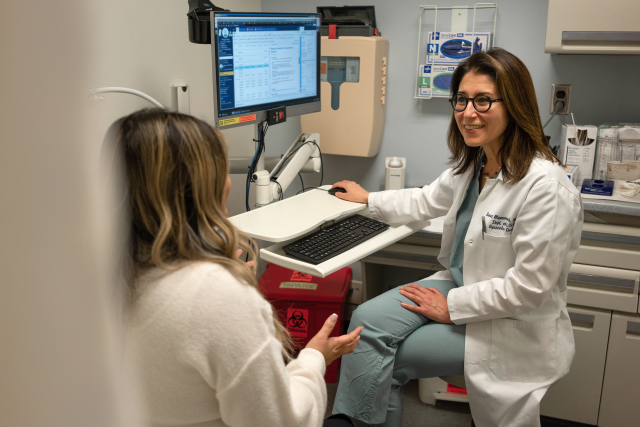Clinical Research
Our Clinical Research Unit works to ensure all patients have access to cutting-edge cancer clinical trials throughout Los Angeles and the nation.
Since 1976, the UCLA Health Jonsson Comprehensive Cancer Center has been designated a Comprehensive Cancer Center by the National Cancer Institute (NCI) of the National Institutes of Health (NIH). As such, the Cancer Center is dedicated to excellence and adherence to the highest ethical standards in both the delivery of patient care and the conduct of research.
The UCLA Health Jonsson Comprehensive Cancer Center offers cancer clinical trials throughout its Oncology Clinical Trials Network. The Network offers clinical trials to cancer patients at a wide range of locations. These include UCLA Hospitals, Main Campus clinics in Westwood and Santa Monica, UCLA owned-and-operated community oncology practices across California, and throughout the United States via the TRIO-US Network (Translational Research in Oncology-US).
To search for cancer clinical trials at UCLA, please visit our clinical trials search tool. You can also call the Clinical Trials Hotline at .
Infrastructure and Operations
Clinical research infrastructure and operations reside under the Cancer Center's Clinical Research Unit (CRU), which works to ensure all patients have access to cutting-edge cancer clinical trials throughout Los Angeles, California, and the nation. The four CRU divisions are listed below.
Clinical Research Support Services Division (CRSS)
The CRSS Division, led by , is responsible for: administration of scientific review of all cancer clinical research studies through the Cancer Center's Disease Site Groups and the Internal Scientific Peer Review Committee; administration of the Data Safety and Monitoring Board; standardized clinical research training and education for faculty and staff; regulatory compliance, monitoring and auditing of investigator-initiated studies with DSMB oversight; and federally required reporting.
Clinical Trials Development Division (CTD)
The CTD Division, led by , is responsible for soup-to-nuts support for the development and execution of investigator initiated clinical trials. Services include but are not limited to: concept development and protocol writing; study activation and regulatory coordination; clinical trial execution; and manuscript preparation.
Clinical Research Execution Services Division (CRES)
The CRES Division, led by , is responsible for cancer clinical trial study activation and study execution, including patient-facing duties and clinical trial management, regulatory compliance, internal quality monitoring and auditing at UCLA's hospitals, and Main Campus clinics in Westwood and Santa Monica.
Community Oncology Research Services Division (CORS)
The CORS Division, led by , is responsible for study execution, including patient-facing duties and clinical trial management, regulatory compliance, internal quality monitoring and auditing for UCLA owned-and-operated community oncology practices throughout California.
Protocol Review Committees and Quality Assurance
The NCI requires that each cancer center has a Protocol Review and Monitoring System (PRMS) to assess scientific merit and feasibility of all protocols studying subjects diagnosed with, or at risk for, cancer conducted at our Cancer Center and to monitor for accrual and scientific relevance. At its core, the PRMS is responsible for ensuring all clinical research has a sound design with scientific merit and undergoes a rigorous review. The overall PRMS process requires assessment of clinical research protocols at two levels: Disease Site Group review through the 15 Cancer Center Disease Site Groups and centralized cancer center review through the Internal Scientific Peer Review Committee (ISPRC).
The Disease Site Groups and ISPRC are required to evaluate all oncology clinical research studies prior to implementation at UCLA. ISPRC also reviews protocol amendments and annual accrual activity as they are submitted.
Additionally, investigator-initiated interventional clinical research protocols require Data and Safety Monitoring oversight through the Cancer Center's Data and Safety Monitoring Board (DSMB). DSMB approval is required after DSG approval and before ISPRC submission.
Proper conduct of clinical trials in oncology is ensured by the Internal Quality Assurance Program, established in 1986.
Clinical Research Programs and resources
Below are the clinical research programs and resources available to you as a UCLA Health Jonsson Comprehensive Cancer Center member. Click the button to follow the link and access more information.

Activate a Study
Activation of a new study requires study approval steps within the Cancer Center and Enterprise-wide, including interventional and non-interventional cancer-related studies.

Disease Site Groups (DSG)
The Cancer Center operates a series of multi-disciplinary disease site groups responsible for initial review of all interventional cancer clinical trials protocols at UCLA.

Data and Safety Monitoring Board
The Cancer Center operates a series of multi-disciplinary disease site groups responsible for initial review of all interventional cancer clinical trials protocols at UCLA.

Internal Scientific Peer Review Committee (ISPRC)
The Internal Scientific Peer Review Committee (ISPRC) reviews clinical oncology protocols conducted by Cancer Center investigators.

Internal Quality Assurance Program
The Cancer Center has a long-standing Internal Quality Assurance Program (IQAP) to ensure proper conduct of clinical trials in oncology and safeguard the rights and welfare of the study subjects.

Helpful Information
Contact information and other helpful information for the JCCC New Study CAFÉ Application.
